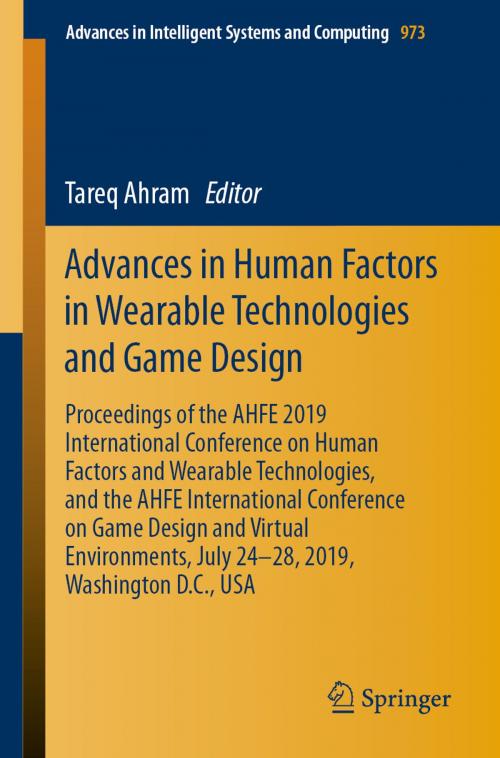Advances in Human Factors in Wearable Technologies and Game Design
Proceedings of the AHFE 2019 International Conference on Human Factors and Wearable Technologies, and the AHFE International Conference on Game Design and Virtual Environments, July 24-28, 2019, Washington D.C., USA
Nonfiction, Computers, Advanced Computing, Programming, User Interfaces, Science & Nature, Technology, Engineering, Health & Well Being, Medical| Author: | ISBN: | 9783030204761 | |
| Publisher: | Springer International Publishing | Publication: | June 13, 2019 |
| Imprint: | Springer | Language: | English |
| Author: | |
| ISBN: | 9783030204761 |
| Publisher: | Springer International Publishing |
| Publication: | June 13, 2019 |
| Imprint: | Springer |
| Language: | English |
This book focuses on the human aspects of wearable technologies and game design, which are often neglected. It shows how user-centered practices can optimize the wearable experience, thus improving user acceptance, satisfaction and engagement with novel wearable gadgets. It addresses both research and best practices in the applications of human factors and ergonomics to sensors, wearable technologies and game design innovations, as well as new findings on the integration of wearability principles with regard to: aesthetics, affordance, comfort, contextual awareness, customization, ease of use, ergonomics, information overload, intuitiveness, obtrusiveness, privacy, reliability, responsiveness, satisfaction, subtlety, user-friendliness and wearability.
Gathering the outcomes of both the AHFE 2019 Conference on Human Factors and Wearable Technologies and the AHFE 2019 Conference on Human Factors in Game Design and Virtual Environments, held on July 24–28, 2019 in Washington, DC, USA, the book addresses the needs of professionals, researchers, and students whose work involves the human aspects of wearable, smart and/or interactive technologies and game design research.
This book focuses on the human aspects of wearable technologies and game design, which are often neglected. It shows how user-centered practices can optimize the wearable experience, thus improving user acceptance, satisfaction and engagement with novel wearable gadgets. It addresses both research and best practices in the applications of human factors and ergonomics to sensors, wearable technologies and game design innovations, as well as new findings on the integration of wearability principles with regard to: aesthetics, affordance, comfort, contextual awareness, customization, ease of use, ergonomics, information overload, intuitiveness, obtrusiveness, privacy, reliability, responsiveness, satisfaction, subtlety, user-friendliness and wearability.
Gathering the outcomes of both the AHFE 2019 Conference on Human Factors and Wearable Technologies and the AHFE 2019 Conference on Human Factors in Game Design and Virtual Environments, held on July 24–28, 2019 in Washington, DC, USA, the book addresses the needs of professionals, researchers, and students whose work involves the human aspects of wearable, smart and/or interactive technologies and game design research.















